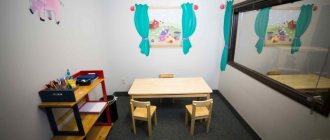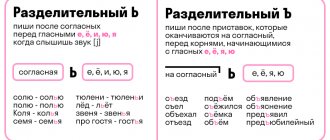This question is often asked by fathers and mothers who brought their children for a consultation. Many parents have heard that “a speech therapist works with a child from the age of five” and are waiting for the “cherished age” to arrive. And completely in vain. Often, such an expectation leads to the fact that important years for speech development are lost, when it would be possible to help the child replenish his vocabulary, form articulatory movements necessary for producing speech sounds, and develop phrasal speech.
In psychology there is such a concept - “sensitive period”, i.e. the most favorable time for the development of one or another function, one or another human ability. For speech, this period is up to the age of five years, and it is at this time that classes with a speech therapist will bring the greatest benefit to the child. It is important for caring and attentive parents to know the patterns of speech development of preschoolers and regularly consult with a speech therapist (children's clinic, kindergarten, speech center).
Speech therapist - who is he and why is he needed?
A speech therapist is a specialist who deals with the elimination and correction of speech disorders in children. With its help, you can correctly “place” sounds, eliminate stuttering and other defects in the spoken genre.
In addition, going to a speech therapist opens up a lot of additional opportunities in terms of the child’s development: physical formation of the speech apparatus, concentration of visual and auditory attention, checking the appropriateness of the baby’s age and his intellectual development. Diagnostics and training take place in the form of games, which, without a doubt, will appeal to the child.
Classes with a speech therapist will help the child formulate his thoughts correctly and quickly. This provides greater opportunities for understanding the surrounding reality and communicating with peers. It is recommended to consult a speech therapist if you have the following disorders:
- phonemic – disturbances in the pronunciation of a sound or group of sounds;
- general underdevelopment of speech – violations of sound pronunciation, vocabulary deficit;
- phonetic-phonemic - violation of sound pronunciation and replacement of some sounds with others;
- stuttering – involuntary repetition of syllables and letters, forced stops during speech.
Prices for group speech therapy classes
| Types of activities | Cost of one lesson/session | Duration of one lesson/session | Recommended number of classes/sessions |
| Group speech therapy session | 600 rub. | 45 min. | from 2 times a week |
| Logorhythmics group lesson | 600/800 rub. | 45/60 min | 1 time per week |
In group classes, work is carried out in the following areas:
- starting speech - for children who do not speak at all;
- enrichment of vocabulary - each lesson is devoted to a specific topic;
- development of fine and gross motor skills - techniques such as logorhythmics, finger gymnastics, etc. are used;
- development of the muscles of the articulatory apparatus - articulatory gymnastics, various exercises;
- development of coherent speech - the ability to correctly construct sentences and express one’s thoughts in a way that is understandable to others.
Modern speech therapy believes that sound production should not be done in a group. But this lesson format is suitable for solving many other problems.
When to visit a speech therapist - we focus on the baby’s age
In fact, there is no recommended age for preventive exercises with a doctor. You can start visiting a speech therapist by the end of the child’s first year of life. In order for the baby to start speaking on time, it is necessary to find out the degree of understanding of the speech of others, what psychological functions have already been developed, and which ones need to be stimulated.
Speech development has a clear time frame. In other words, at a certain age, a child must master certain things. If this does not happen, parents need to contact a specialist.
Standards:
- from 10 months – the child’s speech moves from babbling to conscious words;
- from 10 to 24 months – the baby begins to use phrases and speech structures;
- up to 5 years - the child begins to study the system of his native language - masters speech structure, vocabulary, and correct pronunciation.
Features of the first lesson with a speech therapist
The first meeting with a speech therapist may take place at the end of the child’s first year of life. First of all, the specialist will pay attention to how the baby has developed an understanding of the speech of others. A child at this age, as a rule, understands the names of his favorite toys, parts of the body, face, understands the names of actions and can follow simple instructions from adults (“Wave your hand”, “Give me the ball”, “Have mercy on the bear”, etc.). The child understands the word “impossible”; loves when they play with him, when they praise him, actively communicates with loved ones. In the baby’s independent speech, individual words (“dad”, “mom”, “baba”, “am”, etc.) and onomatopoeia (“meow”, “bi-bi”, etc.) appear.
In order for the first words to appear on time, it is important for parents to know where the child’s speech development begins and what mental functions need to be developed in the first year of life.
Some parents believe that speech appears due to the movements of the lips and tongue. But the presence of articulatory organs in a person does not at all guarantee that he will certainly speak. Human speech is the result of the activity of the cerebral cortex (in the cortex there are special zones (centers) responsible for the speech function: one center is responsible for understanding the speech of other people, the other for independent speech), and the organs of articulation only carry out commands coming from the brain via pathways (cranial nerves).
The first six months of life, communication is based on the emotional contact of parents with the child. Adults, with a calm voice, gentle intonation, soft smile, and warm gaze, show the child how much they love him and how happy they are for him. The baby reacts to this attention from adults with an attentive look, a smile and vocal reactions: first with hooting (short individual sounds), then (from about three months) with a drawn-out melodious hum. It is important for mom and dad to make similar sounds, “to maintain a dialogue,” and then the child will happily repeat these sounds again and again.
From six months onwards, babbling appears - repeated repetition of chains of syllables, reminiscent of speech. Sometimes the baby’s parents mistake babbling for “real speech” and proudly tell friends and relatives: “He’s already talking!” However, babbling is not speech yet, since it has no semantic meaning. During babbling, the child, as it were, “gets acquainted” with his articulatory apparatus, trains articulatory muscles, voice, and breathing.
From this age, the type of communication between a child and an adult changes: from emotional communication to situational and business communication. Now the child’s attention is directed not at the adult, but at surrounding objects, toys, and actions with these objects. And the adult’s task is to show what actions can be performed with objects, to form a cognitive interest in the child. While performing actions with objects and looking at toys, the adult comments on everything that is happening: “Here is a dog. The dog has eyes, ears, and a nose. Here's the ponytail. The dog ran: stomp, stomp. The dog barks: aw-aw...” At first, the baby pays attention only to the object, reaches out to it, but gradually, when the situation is repeated many times, he begins to listen to the word and tries to repeat the word after the adult. Thus, an understanding of speech is formed, and the child’s so-called passive vocabulary is laid. The famous Russian researcher of children's speech, A.N. Gvozdev, wrote that a child needs to hear a new word at least 100 times before he pronounces it independently. Taking into account these features of speech development, parents should understand: when talking with a child of the first year of life, commenting on everyday situations (“Let’s wash our hands. Turn on the warm water. That’s how strong the stream is running. First, let’s soap one hand, now the other. Let’s wash off the soap with water.” etc.), you thus create the basis, the foundation for the appearance of the first words and the formation of speech as a whole.
During the consultation, the speech therapist will tell parents how to communicate with the child so that his vocabulary is replenished. Will teach simple games to develop motor skills of the fingers and the whole body, perception and attention of the baby.
The main misconceptions of parents:
- A child’s speech is formed before the age of 5, so there is no point in contacting a specialist earlier - not all parents can objectively assess the development of a child’s speech. Therefore, it is important to contact a speech therapist for a reliable analysis of the child’s development, whose disorders can begin even at a very young age;
- incorrect pronunciation will be eliminated by itself - some speech imperfections (replacing complex articles with simpler ones) can indeed exhaust themselves with age. However, if by the age of 4 the problem still remains, then it must be solved with the help of professional help;
- if the child does not speak at all, then a speech therapist will not help here - a speech therapist deals with speech production in the broadest understanding of the word. His work is carried out at all levels of the speech system, including the psychological aspect;
- You can take care of your child without outside help - many parents who decide to teach their child personally do not even suspect that their own phonetics are not entirely correct. The speech therapist will show you correct pronunciation and effective training exercises;
- To achieve results, 1-2 sessions with a speech therapist are enough - the course of speech correction is determined on an individual basis. One child will really only need a couple of lessons, while another child will need long courses to correct the problem.
You and your children can undergo all studies and necessary consultations at the Caring Doctor Clinic. You can make an appointment by calling 244-88-74, 8-951-661-77-44
Speech therapist at the Caring Doctor clinic
It is important not to miss the golden time in speech development
In what cases does a child need help from a speech therapist? What age is optimal for contacting a specialist and making complex sounds? How can parents help with speech development? Deniza Raisovna, a speech therapist at the medical and health clinic, answers these and other questions from the readers of “U-Mama”.
—How do you know if a particular child needs the help of a speech therapist? List the main situations that are a reason to contact a specialist.
— As a rule, attentive mothers themselves notice if something is wrong with the child. Age standards are relative, so you should not compare your baby with other children. But you need to be observant. I will name some points that should definitely alert parents and force them to contact a speech therapist as early as possible.
* It is imperative to see a specialist at the age of two years if there were any deviations during pregnancy and childbirth. When the brain of a fetus or infant experiences hypoxia, speech centers may also be affected.
* An equally important indication is deviations in the structure of the speech apparatus. For example, a short frenulum, weakness of the tongue muscles, salivation (excessive drooling), a fixed or poorly mobile tongue root, malocclusion, etc.
* There are almost certainly problems with speech if the child does not gurgle in infancy, if by the age of one year he does not utter even primitive words: “mom”, “dad”, if in his attempts to address you you do not feel different intonations.
* If a child at the age of two or three still does not speak and uses only onomatopoeia - this is definitely a speech delay, you need to contact a specialist. Also, if by the age of 3-3.5 years sentences and an active vocabulary have not been formed, the child only answers adults’ questions in monosyllables.
— What to do if a child lags behind age norms? How should parents react to diagnoses?
— First of all, don’t panic. Each child is individual, some begin to speak a little earlier, others a little later. For example, there are children who understand everything, but remain silent until they are two years old, accumulate a vocabulary, and then begin to speak fully and coherently, sometimes even better than their peers.
But you shouldn’t think that everything will come on its own with time, and you shouldn’t sit idly by waiting for such a successful outcome. If it later turns out that the child does have some problems, then the best time to eliminate and shape them will have already been missed.
— Still, at what age does it make sense to work with a speech therapist, in particular, to introduce complex sounds? Many people say that there is no point in this until the age of five.
— Indeed, if a child generally develops normally, then until the age of five, some small deviations do not frighten parents. They expect that the child will eventually begin to pronounce sonorous sounds, hissing and whistling. It also happens. But sometimes a child comes to school with delayed speech development and undeveloped phonemic hearing. Feeling that he is speaking incorrectly, he may begin to feel shy and withdrawn, especially if his peers do not understand him or tease him.
Moreover, until the age of five, a child absorbs everything like a sponge; it is much easier for him to learn new things. It is important not to miss this golden time.
Therefore, to the question at what age to contact a speech therapist, I will answer: at any age! My youngest clients are only one year and three months old. It is especially important to start correction early if there are serious violations, which we discussed above.
— Our reader asks a question. The child is four and a half years old. When he speaks slowly and tries, his speech is intelligible. But if he is in a hurry, he swallows many sounds or replaces them with others. During classes, it is difficult for the child to sit still; he constantly runs and jumps. Is there any point in continuing to work with a speech therapist at this age or is it better to postpone it?
“If it’s difficult for a child at four and a half years old, then it can become even more difficult, so there’s no time to waste. Obviously, children under five years of age are less assiduous. But this is a sensitive period when you can achieve the best results. Of course, classes should be adapted to the child’s age and consist of a variety of play and physical activities. The game can include a lot for correct pronunciation and perception.
I have come across parents complaining: “My child is not diligent, he will never last forty minutes in class.” And then they are surprised when their beloved child does not want to leave even after an hour spent with a speech therapist.
- How do you do this?
— Interesting selected didactic material, change of activities, friendly atmosphere.
— Tell us in more detail how the speech therapist’s classes are held at the “Mom’s Club”?
— First of all, we focus on an integrated approach to child development. A speech therapist is by no means a highly specialized specialist who specializes in producing sounds. The basis of my classes is general massage and massage of the speech apparatus, finger, breathing, facial and articulatory gymnastics, as well as the development of phonemic hearing.
I select gaming material taking into account the individual and age characteristics of the child.
Children, especially small or hyperactive ones, need a constant change of activities. For example, first massage the speech area, then mold it from plasticine to get, albeit small, results. Then jump and do breathing exercises. Then read and retell the story. Throughout the lesson, a certain sound is automated. After each action, I try to praise the child: “Well done, you did it!” Experiencing a situation of success motivates him to work further.
In general, the most important thing, it seems to me, is to love the child, accept him completely, and sincerely want to help him. When a child comes to me, it is no longer only the child of mom and dad, but also a little bit my child.
— You mentioned massage. What connection does it have with speech therapy problems?
- The most direct one! Massage is a great way to awaken the entire body and get it into good physical shape. Moreover, not only children, but also schoolchildren with speech problems need massage. Any water procedures are also useful - douches, exercises in the pool. Thanks to them, children become calmer, increased muscle tone is relieved, and the results of speech therapy work noticeably improve.
The Mom's Club has an excellent massage therapist and a swimming pool for children from birth to five years old. We recommend that you combine speech development classes with these general strengthening procedures.
Directly in my classes, I also provide massage of speech zones. It allows you to perfectly prepare your lips, cheeks and tongue to pronounce sounds correctly.
— How can parents, for their part, help a child with speech disorders? Does the result of a specialist’s work depend on the participation of mothers and fathers in the process?
— Parents' help is very important. Often parents bring their child to classes at the center only two or three times a week, but ideally they need to study every day, so we give the children homework. If parents conscientiously and regularly perform all the exercises with their child, then the result is guaranteed.
It is important to create comfortable conditions for the child and a favorable mood for a successful lesson. He should enjoy his victories, his results. Parents need to encourage, encourage curiosity and diligence, because children happily try to repeat situations of success.
To create a calm atmosphere, it is important that the parents themselves are patient and interested.
— Have any new methods of solving speech therapy problems appeared in recent years?
- Everything new is well forgotten old. It would seem that new directions exist. For example, fairy tale therapy, sand therapy. But in fact, such techniques have been used since time immemorial, there just weren’t such beautiful terms. At all times, children were told fairy tales and developed fine motor skills in various ways.
Some parents tend to trust alternative medicine methods. For example, su-jok acupuncture. Of course, you can try something non-standard, but you need to understand that there are no miracle cures. Therefore, you cannot rely solely on one technique. A set of diverse measures is always necessary. In case of severe violations, it will inevitably have to be supplemented with medications.
— Let's return to the questions of our readers. Can we expect that the throaty “r” will gradually change to the correct sound?
- This doesn’t happen. If a child replaces “r” with “l”, spontaneous correction can still occur. But if the “r” is glottal, the back of the tongue works. This cannot be corrected without the help of a speech therapist.
— What mistakes in writing indicate the need to show your student to a speech therapist?
— Written speech, like oral speech, belongs to the sphere of activity of a speech therapist. Most likely, the problems that arose at school were preceded by disturbances in the pronunciation of sounds; parents simply may not have attached any importance to this. When a child made sounds with replacements, adults thought it was cute and funny. It was only when they encountered problems in their studies that they began to sound the alarm.
Speech therapy difficulties are evidenced by specific, ubiquitously repeated errors: mixing of letters denoting sounds similar in style (“b” and “d”, “l” and “m”), or similar in sound (letters denoting whistling, hissing voiced sounds are more often mixed , deaf), omissions of letters, their rearrangements, addition of extra letters and syllables.
Every year there are more and more children who have similar problems in writing. Unfortunately, schools often evaluate all students on the same scale and do not take into account that children with speech problems need special treatment. Ideally, a school speech therapist is needed.
— Can a speech therapist help if a child has serious neurological diseases, and at the age of three he practically does not make any sounds?
- You should definitely contact a speech therapist. But a child with complex diagnoses must be seen by several specialists: a speech pathologist, a psychologist and a neurologist, who will prescribe medication.
— Does it make sense to work with a speech therapist if a child has to undergo surgery affecting the speech apparatus?
— In this case, classes are needed both before and after surgery. Before surgery, a speech therapist will help form phonemic hearing, which will become the basis for further speech development.
— Should we rely on the fact that a child’s speech problems will be solved in kindergarten?
— There are good specialists working in preschool institutions, but they are very limited in time. As a rule, children are taken to classes only twice a week, with one lesson being a group lesson and the other an individual lesson lasting 15-20 minutes. What can you accomplish during this time? For example, it takes me 10-15 minutes just to massage the speech apparatus.
Therefore, if a child has difficulties, you should not expect that they will be completely overcome in kindergarten. Either the parents themselves will have to actively get involved in the work, or contact specialized centers where a speech therapist can provide individual assistance.
— How to choose a good speech therapist?
— It’s difficult for me to identify specific criteria. I think the best thing is to rely on reviews from other moms. Observe the results. And, of course, take into account how your child feels about the specialist, how comfortable he is with him. Children do not accept falsehood and, on the contrary, feel if they want to help them.
— Modern children spend a lot of time in front of the TV and actively use gadgets. How does this affect speech development?
— An overabundance of cartoons and other television programs leads to the fact that children cease to understand what they are watching. I believe that you need to choose only good, kind cartoons, while limiting the time you watch them. And the most important thing is to discuss with the child what he saw: how he understood the plot, which of the characters he liked, etc.
The same goes for gadgets. Yes, it is difficult to completely do without them in our century. Yes, there are a lot of interesting development programs now. But the use of electronic devices can only be allowed within very, very reasonable limits! Otherwise, the child loses his sense of reality, and vision, speech, and memory suffer.
— Share proven methods for preventing speech disorders. What rules should be followed from the cradle so that in the future you will have to turn to speech therapists less?
— As I already said, it is important to engage in general physical development from infancy: massage, swimming pool, gymnastics, hardening, etc. Give your growing child plenty of opportunities to move. Be sure to do finger exercises and develop fine motor skills - after all, hands are the second organ of speech. It is very useful to play ball, color with pencils, do breathing exercises and eye exercises.
Now both on the Internet and in the literature there is a lot of information on how to do articulatory gymnastics. Just remember that it is very important to perform the exercises correctly and clearly; be sure to do it in front of the mirror. Certain types of massage of speech areas can be performed at home using a toothbrush.
For speech development, it is very important how parents communicate with their child. Do they talk to him from birth or silently feed him and put him in his crib? Do they read books to him? Do they sing songs? How correctly do you pronounce complex sounds?
Don't be afraid to use full adult speech when communicating with your baby. Believe me, it is impossible to form a “rich” vocabulary if you hear only “usi-pusi” all your life. Explain what complex words mean, help decorate the speech with interesting phrases. In a word, don’t simplify everything, don’t be afraid to move forward. And soon your child will begin to independently construct beautiful, correct sentences.
— Your wishes to the parents.
— Love your children and accept them for who they are. And at the same time, help us develop, become more self-confident, brave and strong! Clean and correct speech always contributes to this and helps to be successful in life.
In turn, the Mom’s Club specialists will be happy to see your children in classes. We strive to create the most comfortable conditions and offer a full range of services for harmonious development. But most importantly, we accept all children with love, rejoice in their differences and look for our own approach to each little person.
"Mom's Club" is waiting for little guests and their loving mothers at:
Ekaterinburg, Mira street, 44b. Tel. (343) 379 07 97.
Website: www.maminclub66.ru
Group classes and their effectiveness
Speech therapists believe that working in a group consisting of children with similar speech impairments is often more effective than individual sessions. At the same time, children gain not only speaking, but also social skills. At the same time, group work can be combined with individual lessons - this way we use the advantages of both approaches and get the opportunity to consolidate the results obtained.
Classes are conducted in stages, in accordance with a pre-developed and approved program. At each stage certain tasks are solved.
We recruit children of all ages into speech therapy groups. The specific focus depends on the goal that is set for them. Some groups are intended for a child who does not yet speak, while others consist of preschoolers preparing for school. Teenagers are also invited - speech therapy can help them correct speech disorders.
Does your child need help in eliminating speech development deficiencies? Specialists will provide you with the necessary services. Do not delay your visit to our organization. Modern speech therapy claims that the earlier a child starts classes, the more effective they will be. Our staff is ready to answer your questions at a time convenient for you. Online consultation is possible.
Or maybe it will go away on its own?
If a child lags behind his peers in some way, this is not a cause for concern. Children develop unevenly: sometimes they accumulate experiences and impressions in order to then make a breakthrough. So one child already speaks in phrases, and the other only in words. One immediately began to clearly “growl”, and the other pronounced words in the French manner. One understands that cucumber and tomato are vegetables, while the other does not know how to generalize the concepts. To assess the level of speech development of children, psychologists and teachers have developed special manuals.
Instead of comparing your child to others, offer tests one to two months apart. If your son or daughter's abilities improve over time, everything is probably fine. If it seems to you that the child is standing still, seek advice. When a child distorts sounds or makes grammatical errors: for example, “grandmother went to the store,” he should be shown to a speech therapist. The sooner a specialist begins to observe a child, the greater the chance of successful speech correction. A speech therapist does not always offer classes; he may refer you for a consultation with a neurologist or neuropsychologist. At Tetrica you will receive your first consultation with a speech therapist for free. Fill out the form and come meet us!








